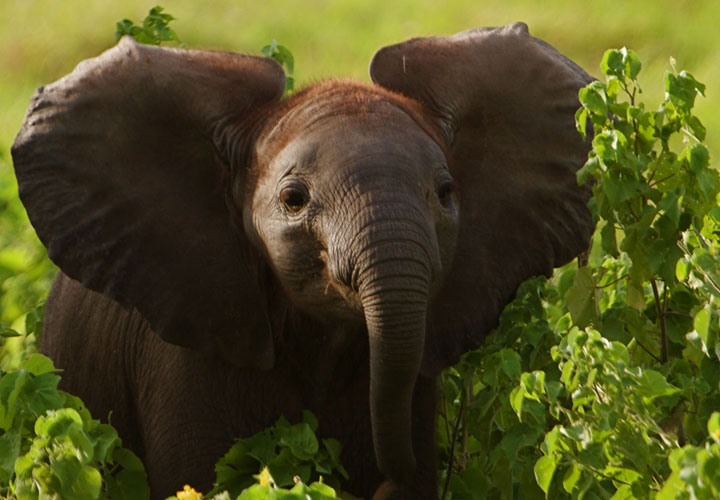Elephant poachers in the act shot dead by park rangers in Kenya
Gang members gunned down by officers during 'fierce shoot-out' at park on Ugandan border

A free daily email with the biggest news stories of the day – and the best features from TheWeek.com
You are now subscribed
Your newsletter sign-up was successful
Elephant poachers were shot dead by rangers as they tried to kill the animals at a national park in Kenya.
Wildlife troopers had been on a routine patrol at Mount Elgon National Park, which straddles the border of Kenya and Uganda, “when they encountered a gang of five men last Thursday”, reports The Independent.
The rangers, from the Kenya Wildlife Service (KWS) exchanged fire with the poachers, who were reportedly armed with AK-47 rifles.
The Week
Escape your echo chamber. Get the facts behind the news, plus analysis from multiple perspectives.

Sign up for The Week's Free Newsletters
From our morning news briefing to a weekly Good News Newsletter, get the best of The Week delivered directly to your inbox.
From our morning news briefing to a weekly Good News Newsletter, get the best of The Week delivered directly to your inbox.
Equipment associated with poaching was later found at the scene, the wildlife service said.
“KWS officers were on patrol inside the park when they spotted the poachers,” Trans Nzoia county police commander Samson ole Kine told Nairobi-based newspaper The Standard.
“A fierce shoot-out ensued and three of the poachers were gunned down while two others escaped. AK-47 rifles were recovered.”
Police county commissioner, Erastus Mbui, said authorities had stepped up security and surveillance operations along the Kenya-Uganda border to deter poachers.
A free daily email with the biggest news stories of the day – and the best features from TheWeek.com
“More officers have been deployed to conduct regular security patrols at the park and ensure wildlife is protected from the poachers,” he said.
“We urge communities around the park to report people they suspect to be on a poaching mission.”
Poaching has declined sharply in Kenya from a peak in 2012 but “it remains a problem, with some 69 elephants and nine rhinos killed last year”, says Metro. Despite a ban on the international trade in ivory in 1997, African elephants are still being poached in large numbers.
“Their tusks are the most sought after, with the ivory being carved into ornaments and jewellery”, adds the paper.
China remains the biggest consumer market for the tusks.
-
 Switzerland could vote to cap its population
Switzerland could vote to cap its populationUnder the Radar Swiss People’s Party proposes referendum on radical anti-immigration measure to limit residents to 10 million
-
 Political cartoons for February 15
Political cartoons for February 15Cartoons Sunday's political cartoons include political ventriloquism, Europe in the middle, and more
-
 The broken water companies failing England and Wales
The broken water companies failing England and WalesExplainer With rising bills, deteriorating river health and a lack of investment, regulators face an uphill battle to stabilise the industry
-
 Epstein files topple law CEO, roil UK government
Epstein files topple law CEO, roil UK governmentSpeed Read Peter Mandelson, Britain’s former ambassador to the US, is caught up in the scandal
-
 Iran and US prepare to meet after skirmishes
Iran and US prepare to meet after skirmishesSpeed Read The incident comes amid heightened tensions in the Middle East
-
 Israel retrieves final hostage’s body from Gaza
Israel retrieves final hostage’s body from GazaSpeed Read The 24-year-old police officer was killed during the initial Hamas attack
-
 China’s Xi targets top general in growing purge
China’s Xi targets top general in growing purgeSpeed Read Zhang Youxia is being investigated over ‘grave violations’ of the law
-
 Panama and Canada are negotiating over a crucial copper mine
Panama and Canada are negotiating over a crucial copper mineIn the Spotlight Panama is set to make a final decision on the mine this summer
-
 Why Greenland’s natural resources are nearly impossible to mine
Why Greenland’s natural resources are nearly impossible to mineThe Explainer The country’s natural landscape makes the task extremely difficult
-
 Iran cuts internet as protests escalate
Iran cuts internet as protests escalateSpeed Reada Government buildings across the country have been set on fire
-
 US nabs ‘shadow’ tanker claimed by Russia
US nabs ‘shadow’ tanker claimed by RussiaSpeed Read The ship was one of two vessels seized by the US military